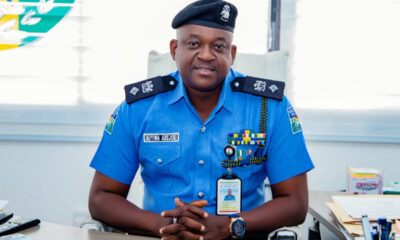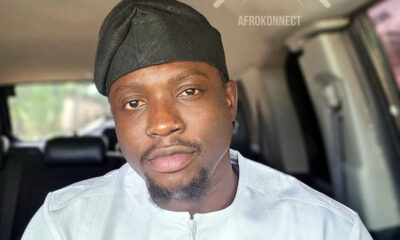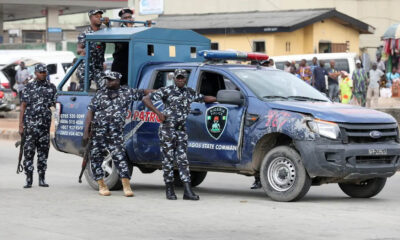Health
Robbers plucked out my eyes because I had no money to give them, says 49-year-old PhD holder living with blindness
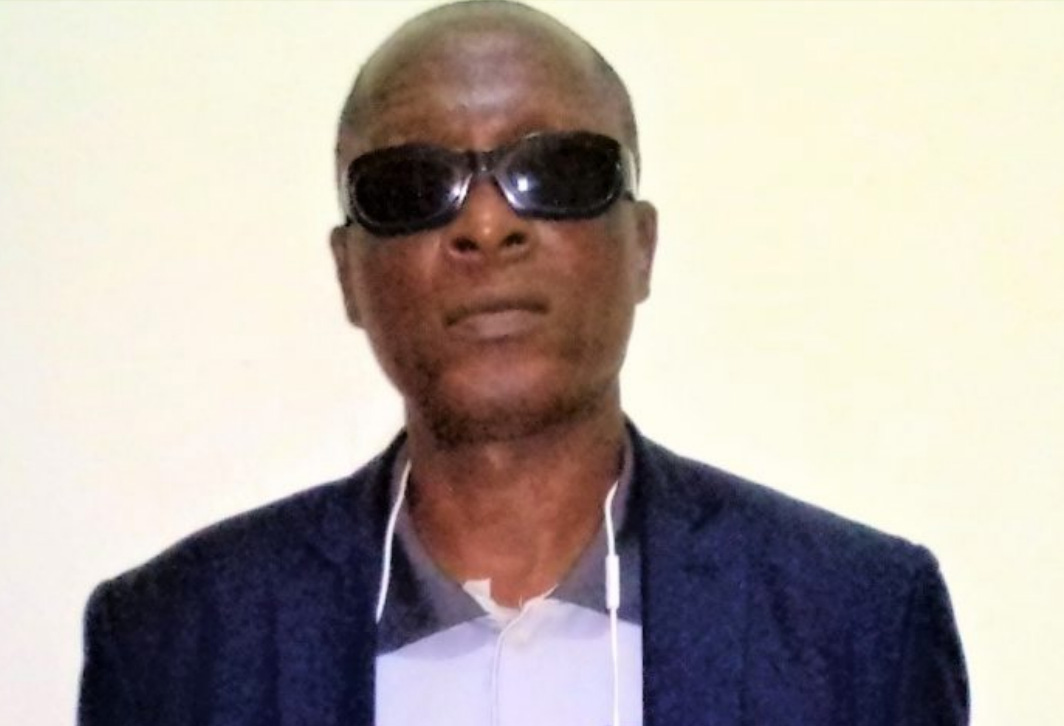
Dr. Michael Ebonhor was not born blind but lost his two eyes at the age of 23, when armed robbers attacked him and plucked out his eyes. The Guidance Counsellor shares with ANGELA ONWUZOO his traumatic experience and how he refused to allow disability to rob him of his dream of becoming a PhD holder.
July 20, 1995 remains a day Dr. Michael Ebonhor will not forget in a hurry. It was a sad and horrific day for him. It was a day that armed robbers plunged him into a world of darkness by plucking out his two eyes, simply because he had no money to give them when they came to rob his neighbourhood.
The robbers, numbering about six, had struck that fateful day and raided his room when he was a 200-level Geography and Social Studies student at the Tai Solarin College of Education (now Tai Solarin University of Education) , Ijebu Ode, Ogun State.
While Ebonhor’s roommate was lucky to have escaped the furry of the robbers who had come with dangerous weapons, including guns and machetes by running away, the Delta State indigene was not that lucky, as the robbers descended on him for not having money to give to them.
The horrific experience was made more traumatic because he was the one struggling to pay his school fees and fend for himself while schooling. He was working part-time as a bus conductor as a student.
Ebonhor, however, even after the unfortunate encounter with the robbers, vowed not to let his loss of sight truncate his dream of becoming a PhD holder.
Although Ebonhor’s blindness was shocking and sudden and was greeted with sadness by his family, the father of two said he has overcome the regret of losing his sight in such a manner, noting that he has no bitterness for the robbers that blinded him. He said will even forgive his assailants if they are eventually arrested by the police.
I was the only one injured because I had no money
Sharing his traumatic experience with PUNCH HealthWise, Ebonhor who is now a Guidance Counselling Officer with the Federal Ministry of Education, Ogun State, said, “I was not born blind. It happened on July 20, 1995. Then, I was 23 and a 200 level student of Tai Solarin College of Education, Ijebu Ode, Ogun State. I was studying Geography and Social Studies at the college and was living off-campus.
“So, that fateful night, a group of armed robbers came to our neighbourhood and raided about six buildings. My building was the fifth that they raided.
When they entered my room, they demanded money. I had a roommate and he was the first person to be dragged out by the robbers. But he was able to escape. When they pursued him up to a distance and could not get him, they came back for me and I didn’t have money to give them.
“When they could not find anything, they asked me to come out and lay on the ground. I was surrounded by six men. Two were holding guns, two were holding cutlasses and the other two were holding an iron.
They used the guns to hit me on the head and used a machete to torture me and in the end, they plucked out my two eyes.
Sadly, I was the only one that was injured during that robbery attack. Those of them that had money and gave it to them were not injured. They were not hurt.”
I was unconscious for hours after my eyes were plucked out
Ebonhor told our correspondent that he nearly lost his life during the attack as he became unconscious for several hours before help came his way.
More traumatic was when he woke up and saw darkness everywhere, wondering how he would sojourn in life without sight in his prime.
“In the morning, my neighbours took me to a nearby hospital where I was given first aid and later I was transferred to the Olabisi Onabanjo University Teaching Hospital (OOUTH), Sagamu, Ogun State.
“I was hospitalised for six months. When the attack happened, I became unconscious. But after some hours, I woke up. So, when I woke up, I saw total darkness and when I realised that my two eyes were gone, I was so devastated.
“Initially, the doctors would come and tell me not to worry, assuring me that all would be well.
“When I asked the chief consultant about my fate, she kept telling me all would be fine. But to what extent, she could not answer.
“Now, there was a day I was taken to the bathroom by a nurse and I hit my shoulder on the wall. That made me shed tears. I just wondered how somebody that was agile and independent would suddenly be led by people here and there. I just imagined how I would be relying on people for my movement.
“So, I asked the doctor after that experience if my eyes would function again and he wondered what brought about the question. I told him that someone wanted to donate an eye for me.
“It was then that the doctor told me that he had to be frank with me, that my eyes were gone and there was no remedy.
“He told me that even if someone donated an eye for me to see again, the nerves connecting my eyes and the brain had been damaged.
“So, nobody can donate an eye for me that will work”, Ebonhor narrated.
I prayed for four days and God asked me to forgive the robbers
He went on, “At that moment, my emotions dropped. For the next two days, I stopped taking my drugs in the hospital. I was not eating regularly.
“From the report, the chief matron had to send for my pastor. The pastor came and with a lot of religious counselling, my mood started changing for good. He asked me to pray to God and ask why the robbery attack happened.
“So, I prayed for four days and the inspiration came. And God asked me to forgive my assailants. From that moment, my mood changed and I forgave them, since God wanted me to forgive them. From the moment I did so, I started getting support from students and staff of Tai Solarin College of Education – my school. And that saved me from an extreme reaction.
“The college rose in support for me. When the incident happened, it was reported to the Odogbolu Police Division in Ogun State and the police conducted series of investigations. But, to date, no arrest has been made. Even if the assailants were arrested today, I would forgive and preach Christ to them.”
Journey of coping with blindness
Six months after the guidance counsellor was discharged from OOUTH, he was sent to a special school for rehabilitation, to enable him to cope with his new phase of life and to be able to live independently again with the right support.
He said, “After I was taken care of medically at the teaching hospital, I went for rehabilitation at the Federal College of Education (Special), Oyo State where I learnt how to do my chores and live independently again despite the disability.
“The college authority kept on visiting me from time to time. And they facilitated the movement of my transcript from the college (TASUED) to Federal College of Education (Special), Oyo State.
“They supported me with money also. Basically, I can say that their support is what has been keeping me going.”
Ebonhor said he vowed not to allow the sad incident to stop his journey of education halfway, even as the unfortunate development brought pain to his parents who had been happy that he overcame poverty to send himself to school.
My blindness brought sadness to my parents
“My parents felt so bad about it. They were not happy. They felt that as a hard-working and jovial young man, I would now depend on others to survive. They felt I would not be able to continue with my education. So, it brought a lot of sadness to them,” he added.
Continuing, Ebonhor said, “When I finished the rehabilitation in Oyo State, my transcript had to be transferred from Tai Solarin College of Education to Federal College of Education (Special), Oyo State, where I completed my National Certificate in Education in Social Studies in 1998.
“From there, I proceeded to Olabisi Onabanjo University, where I did Guidance and Counselling in Education. From there, I proceeded for my masters in 2003.
“In 2007, I commenced my PhD programme in Applied Psychology in OOU. By 2014, I had completed the programme. After that, I got a job with the Federal Ministry of Education between 2015 and 2016. But before then, I was working as a Guidance Counsellor at Mayflower School, in Okene, Kogi State. It has been my dream to have a “doctor” attached to my name and I am happy that my dream has come true, despite living with a disability.”
Getting married was not easy, I suffered rejection
Speaking about his marital life, the guidance counsellor who is also Chairman, Employment Committee, Nigeria Association of the Blind, said getting married was not easy for him as he suffered a lot of rejection from the ladies he approached as a result of his vision loss.
He, however, succeeded in 2005 after several unwavering efforts.
“Getting married was not easy. I got married in 2005. Prior to that time, I had approached some ladies for marriage but it didn’t work out as a result of rejection, owing to my disability.
“I suffered a lot of rejection. But I met my wife in Mayflower School,in 2003, where I was working as a Guidance Counsellor. She teaches in that school and isn’t living with a disability.
“Sometimes, when I was going to work, she would side-guide me and that was how we developed an interest in each other. My wife is from Oyo State. By the grace of God, the marriage has been doing fine and we have two kids,” he said.
Disability does not give me any cause for regret
Asked if he has any regret in life, occasioned by his sudden blindness, Ebonhor noted, “The only regret I have concerning this disability is my inability to play football. That is the only thing. As I am here now, I am into farming. There is nothing that able people can do that I cannot do, except driving.
“Disability does not give me any cause for regret but rather I feel that it has made me who I am today. It’s a blessing in disguise for me. Why am I saying this? Prior to my blindness, I used to come to Lagos from Tai Solarin College of Education to come and work as a bus conductor before I could pay my school fees.
“I started doing that from junior secondary school because my parents had no money to pay my school fees and I had vowed to go to school. So, I am happy that my dream finally came true, despite all odds.”
Punch Healthwise
Health
NAFDAC uncovers syndicate scamming foreign firms with fake documents
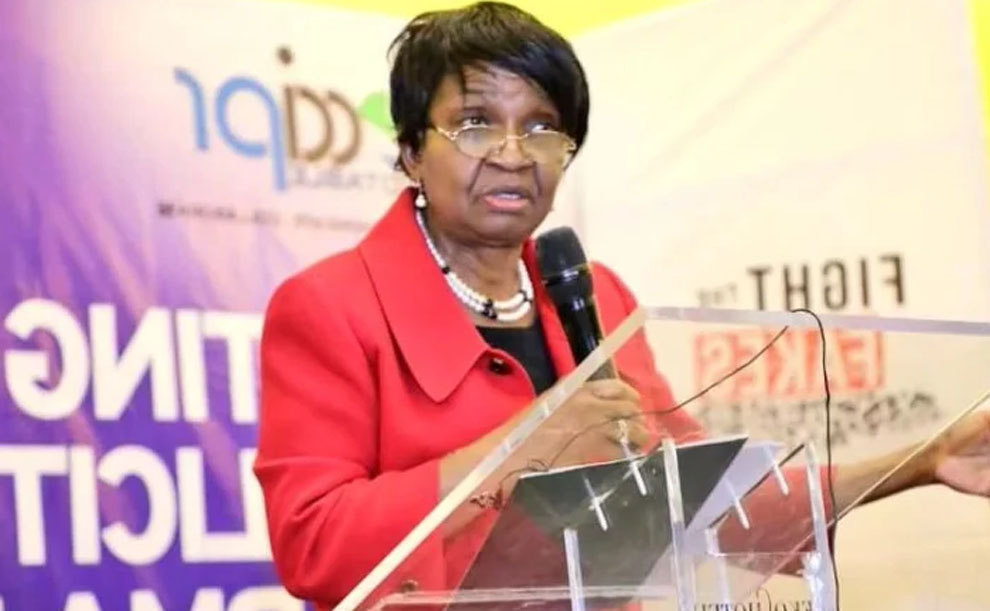
NAFDAC uncovers syndicate scamming foreign firms with fake documents
The National Agency for Food and Drug Administration and Control (NAFDAC) has uncovered a fraudulent syndicate impersonating the agency to scam foreign companies using fake documents.
The agency announced the discovery in a statement by Prof Mojisola Christianah Adeyeye FAS, its Director General, following a petition from Thani Almaeeni Trading Group, Abu Dhabi, UAE, which fell victim to the scam.
It was revealed that the syndicate is being led by one Ikoro Mang Ifendu who was arrested on February 7, 2025, in Aba, Abia State for allegedly defrauding foreign firms by posing as a NAFDAC official.
“Mr. Ikoro Mang Ifendu of 26, Park Road, Aba Abia State, born on the 2nd of January, 1973, was arrested on the 7th of February 2025 at Ogborn Hills, Aba, Abia State in a case of alleged fraud and obtaining huge funds by false pretence from unsuspecting foreigners that cuts across various countries as a NAFDAC Staff. He is a native of Amamba Village, Abiriba in Ohafia LGA, Abia State. His level of education is SSCE and he deals in clothing materials. The suspect is in our custody and is cooperating with the investigation,” the agency stated.
How the syndicate operated
NAFDAC disclosed that the syndicate used a sophisticated three-pronged scheme involving a buyer, a bank, and a lawyer. First, a buyer would contact foreign firms to purchase goods for importation into Nigeria.
READ ALSO:
- Naira strengthens, gains N29.89 against US dollar
- EL-Rufai, police clash over ex-commissioner’s arrest
- How to lower fuel consumption of your car
The company would then be introduced to a bank, where they were informed that NAFDAC approval was required for transactions. A lawyer would subsequently be introduced, claiming to facilitate NAFDAC certification for a fee. Fraudulent receipts and counterfeit NAFDAC certificates were issued to victims.
The fraudulent operation extended across multiple banks and accounts. Investigations revealed that the group managed 15 domiciliary and 5 local accounts in seven Nigerian banks, with an inflow of over $950,000 into Nigerian accounts and $450,000 into offshore accounts in Cotonou, Benin Republic. Even after Ifendu’s arrest, foreign victims continued to send money, with a recent alert of $75,000 received in one of the accounts.
Fake documents used in the scam
The documents used to deceive foreign companies included:
- A counterfeit Certificate of Registration for Dried Fish (Seafood) under the NAFDAC Registration No. A2-7059, issued to Thani Almaeeni Trading Group.
- Fake revenue receipts, including a N6,687,000 receipt dated November 28, 2024, and another N20,900,000 receipt dated December 13, 2024.
- A forged processing requirement document for $13,785, purportedly signed by a former NAFDAC director who retired a year earlier.
- Fraudulent Swift Advice copies, including a $1,990 transaction to Rosemary Obosi and a $3,000 transaction to Ifendu.
- A telegraphic transfer record showing USD 132,972.84 sent to Citycode Savings & Loans, Lagos, on December 24, 2024.
The fraudsters also used letterheads falsely to identify themselves as HALI & CO Chambers, operated by Ifendu and Obosi.
Foreign companies affected
- Aside from Thani Almaeeni Trading Group, other victims identified include
- Japan Long Tie (China) Co. Ltd, Jinan, China (importation of condoms
- BEYOND-Korea, USA
- Aquaforest SP, Poland (drinks and vegetable oil registration)
- Nomea srl, Italy
- Tianyan Filter Cloth Co. Ltd, China
- Siam Canadian China Ltd, China (frozen onion spices)
Case transferred to EFCC
Following NAFDAC’s findings, the case will be transferred to the Economic and Financial Crimes Commission (EFCC) for further investigation. The probe will extend beyond NAFDAC-regulated products to track assets acquired through fraudulent activities.
“This investigation will invoke POCA [Proceeds of Crime Act] on all the assets illegally acquired in the course of these fraudulent activities,” NAFDAC stated.
NAFDAC has warned businesses against engaging consulting firms claiming to facilitate product registrations.
The agency advised firms to verify all NAFDAC-related registrations through its official portal: https://registration.nafdac.gov.ng/
NAFDAC uncovers syndicate scamming foreign firms with fake documents
Health
Diphtheria outbreak: Lagos begins vaccination at King’s College
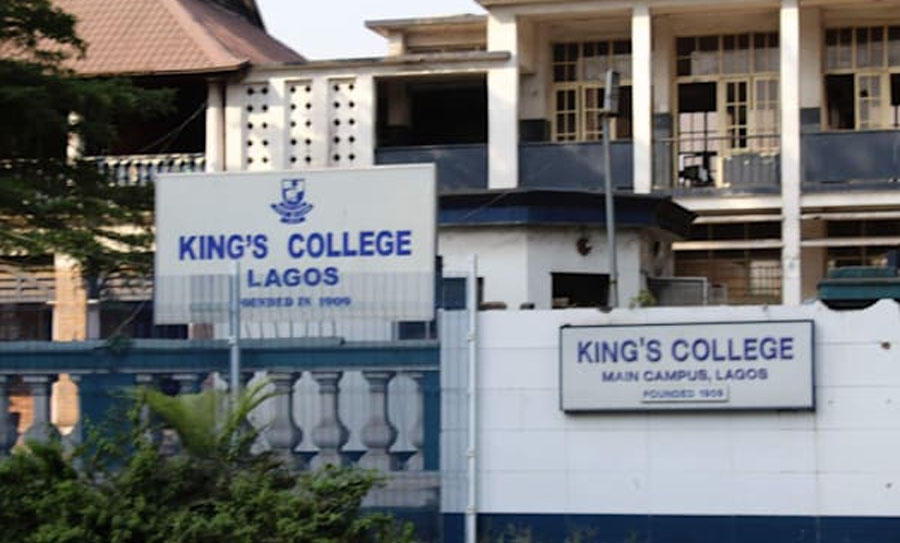
Diphtheria outbreak: Lagos begins vaccination at King’s College
The Lagos State Government has launched a diphtheria vaccination drive at King’s College, Victoria Island Annexe, following an outbreak of the disease.
The state health authorities have activated emergency measures to contain the spread and protect students.
In a statement by the state’s ministry of health, the Commissioner for Health, Prof. Akin Abayomi, confirmed that an Emergency Operations Committee (EOC) has been set up to contain the outbreak and prevent further spread.
“The Lagos State Government has activated its Emergency Response Committee, following the outbreak of diphtheria in the boarding house of King’s College, Victoria Island Annexe,” the statement read.
Newstrends earlier reported that parents raised alarm over the situation, questioning the school’s response and sanitation standards.
According to Abayomi, the index case was a 12-year-old student who presented with a sore throat and fever at the school clinic on February 22. He was referred to the Lagos University Teaching Hospital (LUTH), where he was diagnosed with diphtheria and treated with antibiotics and a full dose of diphtheria antitoxin serum.
“Despite the timely intervention, the boy succumbed to progressive and irreversible inflammation of the heart (myocarditis) on the 6th of March. Myocarditis is a severe and recognized complication of the bacterial infection caused by the toxin,” Abayomi said.
READ ALSO:
- I’m still in APC — Fayemi
- El-Rufai has strengthened our ranks – SDP chairman
- Amnesty seeks justice for Minna footballer shot dead by ‘drunk policemen’
He further disclosed that 34 close contacts of the deceased student were placed under observation, out of which 14 developed symptoms consistent with diphtheria.
“Of these, 14 have developed symptoms consistent with diphtheria. In response, the affected students were transported to the Children’s Emergency Unit at Lagos University Teaching Hospital (LUTH), where they were screened by health professionals,” he added.
Out of the 14 students examined, 12 were diagnosed with early signs of diphtheria and admitted for treatment. The Commissioner assured that all 14 symptomatic students are responding well to treatment, and no new cases have been recorded.
Following a preliminary inspection of King’s College Annexe, health officials identified areas needing improved infection prevention and control measures.
Consequently, the state government, in collaboration with federal health agencies, has commenced a targeted vaccination campaign for all students in both the boarding facility at Victoria Island Annexe and the primary academic campus at Igbosere Main School.
The Lagos State Government also noted that the World Health Organization (WHO), Nigeria Centre for Disease Control (NCDC), and National Primary Health Care Development Agency (NPHCDA) have been notified and are working with the Lagos State Government to coordinate an effective response.
The state is currently distributing information leaflets to healthcare facilities detailing diphtheria symptoms, prevention, and early treatment options.
A public health announcement is being prepared to sensitize Lagosians on the outbreak, urging them to watch for symptoms such as sore throat, fever, difficulty in breathing, and swollen neck glands.
Diphtheria outbreak: Lagos begins vaccination at King’s College
Health
Scientists working to extend human lifespan to 250 years — Expert

Scientists working to extend human lifespan to 250 years — Expert
A leading medical expert, Dr. Ibrahim Wada, has suggested that advancements in medical technology and genetic engineering could push the human lifespan to 250 years in the next 30 to 40 years.
Wada, the founder of Nisa Medical Group, made this claim while delivering the Second Nimi Dimkpa Briggs Legacy Lecture at the University of Port Harcourt (UNIPORT) on Thursday.
His lecture, titled “The Longevity of Man,” explored the rapid pace of scientific breakthroughs that may soon redefine human aging.
He pointed to remarkable progress in genetic science, highlighting the creation of artificial eggs and sperm from human saliva, which could eventually lead to babies being grown in artificial wombs.
“This technology has already produced live rats. It is only a matter of time before humans benefit from similar advancements,” he said.
Wada, an Associate Professor of Obstetrics and Gynaecology at Abubakar Tafawa Balewa University, Bauchi, noted that innovations in stem cell research, artificial organs, and genetic reprogramming could revolutionize human health and longevity.
READ ALSO:
- Lawyers fault Senate’s suspension of Natasha Akpoti-Uduaghan
- Simon Ekpa accounts frozen for alleged terrorism financing
- Bandits kill 12 Zamfara community guards, vigilantes
“Recreating stem cells from a person’s genes and reintroducing them into the body can regenerate dead cells and significantly extend lifespan,” he explained. “In another 30 to 40 years, it will be normal for individuals to expect to live for 200 or even 250 years. This will happen because humanity has now entered the age of computer reprogramming.”
Despite the potential of these innovations, Wada expressed concern that such advanced treatments are not yet accessible in Nigeria. He also underscored the importance of lifestyle choices in promoting longevity, emphasizing regular medical check-ups, a balanced diet, exercise, and adequate rest.
“Rest is essential for brain function. So, when it is time to rest, you must allow the brain to rest – no compromise,” he advised.
During the event, UNIPORT Vice-Chancellor, Prof. Owunari Georgewill, reflected on the legacy of Prof. Nimi Briggs, describing him as a visionary leader and academic powerhouse.
“This is because it is not the breath we take, but the fire we ignite,” Georgewill remarked, raising the question of whether longevity is purely biological or tied to a person’s impact on the world.
Prof. Ngozi Orazulike, Chair of the Nimi Briggs Professorial Chair in Obstetrics and Gynaecology, praised Briggs’ significant contributions to medicine, education, and philanthropy.
Meanwhile, the late professor’s son, Nima Briggs, expressed gratitude for the continued recognition of his father’s legacy.
“It is humbling to see my father’s legacy live on, with events still being organised to honour his memory,” he said.
Scientists working to extend human lifespan to 250 years — Expert
-

 Opinion1 day ago
Opinion1 day agoNasir El-Rufai’s scorched-earth one-man opposition, By Farooq Kperogi
-

 metro2 days ago
metro2 days agoBREAKING: Appeal Court stops Sanusi’s reinstatement as Kano emir
-

 Politics2 days ago
Politics2 days ago2027: Southern Kaduna group rejects El-Rufai, supports Tinubu
-

 Auto2 days ago
Auto2 days agoThree electric vehicles on display steal show at Lagos Motor Fair
-

 Auto2 days ago
Auto2 days agoTheodore Opara inaugurated as new NAJA chairman, other excos sworn in
-

 News2 days ago
News2 days agoHow Natasha can get her Senate suspension reversed – Akpabio
-

 Politics1 day ago
Politics1 day ago10 ex-Buhari’s ministers to dump APC for SDP
-
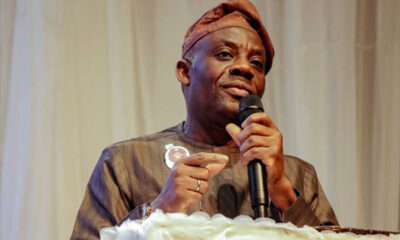
 News2 days ago
News2 days agoJobs: FG begins six-month free IT training for two million youths



